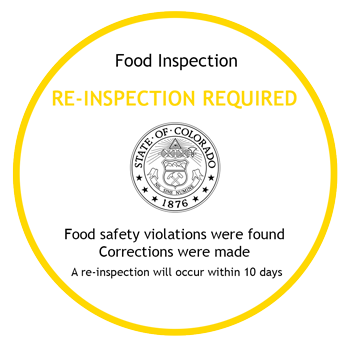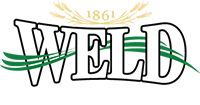Restaurant Inspections are moving to HealthSpace
Weld County Restaurant Inspections after October 16, 2023 can be found on HealthSpace portal.

RETAIL FOOD ESTABLISHMENT INSPECTION REPORT
| Facility Name: | HEARTH RESTAURANT AND PUB |
| Address: | 205 4TH ST WINDSOR, CO 80550 |
| Phone: | (970) 460-0193 |
| Inspection Date: | September 19, 2023 |
| Owner: | J & J INC |
| Inspection Type: | REGULAR INSPECTION |
| Yelp: | Check Now |
| POINTS | VIOLATION | VIOLATION ID |
|---|---|---|
|
20 pts.
|
Proper cold holding temperatures
Comment: (Corrected) Found cut tomatoes, cheese, and lettuce at 50 F. Food was prepped 1 hour before temperature was taken. Foods below in reach in cooler were out of temperature for more than 24 hours. Ambient air temperature in cooler was 51 F. Foods requiring temperature control shall be kept cold at 41 F or below. Corrected by disposing of foods that were off temperature for more than 4 hours and placing the foods in the prep top table on time as a public health control. Found chowder soup tub with lid on in walk in at 46 F. Soup was prepared 24 hours prior to temperature being taken. Foods requiring temperature control shall be kept cold at 41 F or below. Corrected by discarding soup. | 22 |
|
15 pts.
|
No bare hand contact with RTE food or a pre-approved alternative procedure properly allowed
Comment: (Corrected) Observed employee in front pizza prep area cutting cooked chicken and handling with bare hands. Chicken will directly go onto salads for consumption. Bare hand contact with ready-to-eat food is prohibited. Use of gloves, tissue paper, tongs or other adequate utensil is required. Corrected by discarding chicken. | 09 |
|
10 pts.
|
Adequate handwashing sinks properly supplied and accessible
Comment: (Corrected) Found hand sink in pizza prep area without soap. Hand sinks shall be provided with an adequate supply of soap and paper towels at all times. Corrected by adding small hand soap to side of sink. | 10 |
|
10 pts.
|
Proper cooling methods used; adequate equipment for temperature control
Comment: (Corrected) Found salad prep cooler not holding foods at 41. Ambient air was 51-60 F in cooler. Staff stated that cooler has not been working correctly for a while. Service for the cooler is schedule for same day as inspection was completed. Equipment for cooling, heating and holding food shall be sufficient in number and capacity to provide required food temperatures. Corrected by moving foods under prep cooler into walk in and placing top prep area on time as a public health control. | 33 |
|
5 pts.
|
Proper date marking and disposition
Comment: (Corrected) Found cooked vegetables without dates mark in walk in cooler. Food was prepared 24 hours ago. Ready to eat foods requiring temperature control that are held for more than 24 hours shall be labeled with the date prepared or opened, and shall be held for a maximum of 7 days or by manufacturer use-by date, whichever occurs first. Corrected by adding date marks. | 23 |
|
2 pts.
|
Wiping Cloths; properly used & stored
Comment: (Corrected) No measurable sanitizer solution was found in any of the sanitizer buckets located in the kitchen, bar, pizza prep area. Wiping cloth sanitizer solution shall be maintained clean and at the proper concentration (50-200 ppm chlorine or 150-400 ppm Quaternary Ammonia). Corrected by having buckets remixed. | 41 |
Inspection Background
The mission of the retail food inspection program is to prevent food-borne disease (or food poisoning, as it's sometimes called).
The Internet allows us to share inspection information which may help you to make your food purchasing decisions. Reading the inspection
report only, without knowing about the different types of violations, may still lead you to the wrong conclusion about what is safe and what is unsafe.
So, please take a few minutes to familiarize yourself with the inspection process and violation types before reading the inspection reports.
Inspection Frequency:
Retail food establishments include restaurants, grocery stores, convenience stores, bars, schools, bakeries and more. Inspections are scheduled one to three times per year, depending on the size of the menu, number of people served each day, the cooking processes used, whether or not the establishment has had a foodborne illness outbreak or is in extended enforcement action, or serves a population at higher risk of acquiring a foodborne illness.
Violations:
Core item means a provision in this Code that is not designated as a priority item or a priority foundation and usually relates to general sanitation, operational controls, sanitation standard operating procedures (SSOPs), facilities or structures, equipment design, or general maintenance.
Priority foundation item includes an item that requires the purposeful incorporation of specific actions, equipment or procedures by industry management to attain control of risk factors that contribute to foodborne illness or injury such as personnel training, infrastructure or necessary equipment, HACCP plans, documentation or record keeping, and labeling;
Priority item means a provision in this Code whose application contributes directly to the elimination, prevention or reduction to an acceptable level, hazards associated with foodborne illness or injury and there is no other provision that more directly controls the hazard and includes items with a quantifiable measure to show control of hazards such as cooking, reheating, cooling, handwashing.
Retail food establishments operate under the Colorado Retail Food Establishment Rules and Regulations. An inspection report is a "snapshot" of the day and time of the inspection. On any given day, the establishment could have fewer or more violations than noted in the report you are viewing. A single inspection may not represent the long-term performance or safety of the business. Also, all violations are recorded during the inspection but as many as possible are corrected before the inspector leaves. Regulatory re-inspections or "follow-ups" are done as necessary.
Retail Food Establishment Scoring
Risk Index Values of Inspection Violations
Restaurants and other retail food establishments are scored using a risk index system. With a risk index system, as when playing golf, the lower the final number, the better. Violations are more heavily weighted when they pose a greater risk to the safe preparation of food. For example, not cooking chicken to the required temperature would pose a greater risk to a consumer's health than a kitchen floor in disrepair. Point values for violations range from 0-25 points.
|
Pass - Pass means the establishment meets fundamental food safety standards. The establishment could have some priority, priority foundation or core violations. Some or all violations were corrected during inspection. The risk index range is 0-49 total points.
Re-Inspection - Re-Inspection means that food safety violations were found. Corrections may have been made but the rating requires a re-inspection to ensure basic food safety standards are met. The establishment has a higher level of risk with several priority, priority foundation or core violations. The risk index range is 50-109 total points.
Closed - Closed means that significant unsanitary conditions or other imminent health hazards were found. The establishment has multiple priority, priority foundation or core violations representing high risk. Facility must cease operations until conditions and violations are corrected. Facility must receive prior approval by the health authority before reinitiating operations. The risk index range is 110 total points or higher.
Inspection Types
Regular Inspection - Routine, unannounced, nonscheduled inspections. Facilities are inspected between 1-4 times per year based on complexity of operation, population served, and previous food safety performance.
Re-Inspection - Unannounced, nonscheduled inspection within 10 business days after a non-passing inspection (above 50 points).
Closure - Imminent public health hazard present requiring the facility to be closed including: no water, sewage backup, pest infestation, or long-term non-compliance to food safety rules.
Conditions Met to Re-open - Facility has corrected imminent public health hazard conditions and has been reviewed by health department to safely produce food.
Check-in - Quick visit by health department to evaluate or discuss a key item. This may be requested by the facility or based on inspector evaluation of the facility.
Announced Inspection - Scheduled inspection requested by the establishment.
Targeted Training - Scheduled training inspection regarding specific food safety items. For example, proper cooling demonstration for all food handlers.
New Facility Check Up - Nonregulatory inspector "meet and greet" immediately after opening to discuss procedures, answer questions, and ensure food safety compliance.
Retail Food Inspection Search
Some hints for a successful search:
- If you can only remember part of the establishment’s name, try entering the first few letters. Entering part of a name will return all establishments that have names beginning with those letters.
- You can also select a city name together with establishment name.
